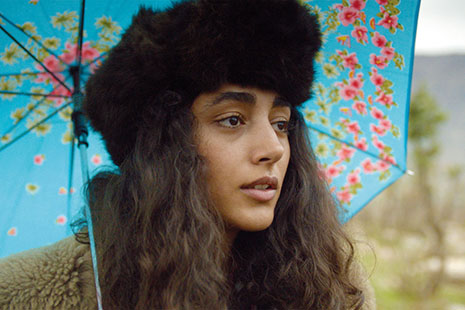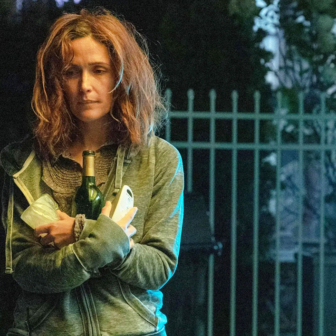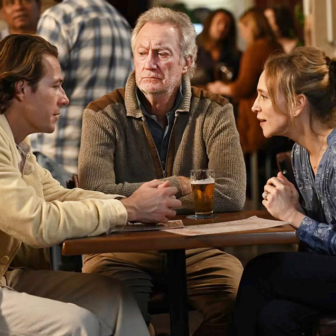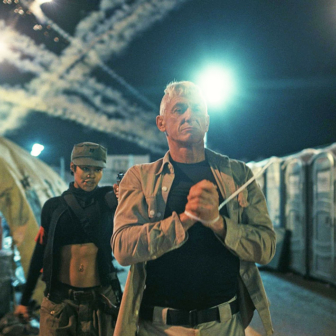There are still some around who can remember when the Sydney Film Festival was run by three-and-a-half people on pay, with a dedicated committee and volunteers. The event was both elite culture, and embattled; fine-art cinema in foreign languages, but still not asking for the kind of attention given to gallery art and concert-going, while out in the marketplace the whole idea was suspect, a threat rather than a stimulus to film distribution and exhibition. It could be tolerated if admission was strictly by subscription.
Now it’s a different story, with fully flexible ticketing; and more importantly, the distributors now regard a couple of festival screenings as useful advance promotion. The festival is fully established middle-class culture, and wildly popular as well, with queues for everything, pages of restaurant ads in the program, and bunting all over town and around the suburbs. You had to be up early to get in to the opening night at the State, the indispensable work on Nick Cave (20,000 Days on Earth, to be discussed in good time), and such fine retrospective treats as the Friday 13th screening of The Texas Chainsaw Massacre at the Blacktown Skyline drive-in. If now, into the festival’s seventh decade, I remark that it’s bursting quite uncomfortably at the seams, I hope its army of labourers will forgive me. (Great people they are too; unlike those Nazis who shove you around at certain other prominent cultural events, they’re all outstandingly good-humoured and cooperative.) The fact is that without a functioning cinematheque in a city this size – or even half this size – the film festival has far too much work to do.
As of the opening week, with five splendid new works emerging from Cannes, there are more than a hundred feature films in the program. Those include eight of Robert Altman’s oeuvre, Nashville and M*A*S*H included. Such retrospectives are among the most important things a festival can do; this one will give some local cinephiles a chance to discover, or rediscover, a body of work marked by multitudinous invention and also by huge ambition. Whether its output amounted, as some believe, to greatness I don’t feel sure, but I’m glad of the chance to look again at McCabe and Mrs Miller. Many other films in the program will be released commercially this year or next, and will be considered then; for the present, this column will look at certain special documentary essays, and fictions which, without the festival, would struggle for audiences.
Meanwhile, there are deserving works on the circuits. You could call My Sweet Pepper Land a Kurdish western, and its director, Himer Saleem, is Kurdish; but this film – wild, abundant little narrative that it is – couldn’t have been the film it is without European input, and it is effectively a Franco-German co-production. The generic structure is there; the good sheriff Baran (Korkmaz Arslan) comes to a bad town, a disorderly village on the boundary between Turkey and Iraq, a place with one dismal bar called Pepper Land, and one phone. Here the schoolteacher Govend (Golshifteh Farahani) is trying against huge odds to keep a class going. Baran’s story might make you think, momentarily, of Gary Cooper in High Noon, or James Stewart’s role in The Man Who Shot Liberty Valance, and of the way women show up as schoolteachers in one classic Western after another; but those echoes fade. This is now; Saddam has gone, but other battles continue. There are girl guerillas, a feisty tribal group, dodging round these high, dry mountains firing at the Turks. The schoolteacher is seen trying to impart elementary arithmetic. “One and one?” she invites. “Mother and father?” A little boy responds mischievously: “Mother and father makes ten children.”
In Pascal Auffray’s cinematography the rocky landscapes dominate, with their heights and mists and almost palpable cold. Those images link with music to deepen the sense of remoteness; Baran likes Bach, Mozart and Elvis (Jailhouse Rock), while Govend manages moments of solitary peace, playing a tin drum. She is improbably beautiful; think of the face of Virginia Woolf when young, give her dark hair and you can see Govend. At the advanced age of twenty-eight, she has fought a family of brothers to refuse an arranged marriage, claim independence and make her journey, but the toughs of this town are worse than her brothers.
With all that, Golshifteh Farahani is in the film as a star (she has a fair track record by now, having played roles for Ridley Scott and Asghar Farhadi); and it’s a bit unsatisfying that as the star and within the narrative, her character is isolated. Pepper Land is a male resort; Govend has to bargain and argue for her key to the schoolhouse. The story doesn’t provide any links between her and the women in the village, and no sign of solidarity with the girl soldiers. But it’s in the female struggle, and not only hers, that the film as it were slips its formal moorings, and plunges outwards; this is indeed about Kurdistan, but it is also inescapably about all the places where there are mass kidnappings of schoolgirls, honour killings, and the judicial murders of women who lift their heads and disobey; does that mean everywhere? It isn’t only female independence, the presence of women in public life, that gives offence; the greatest affront is the alliance of female presence with knowledge.
If there are festival-goers who react against the extravagant sprawl of the Robert Altman programs, here’s a cure. Ida, a small-scale Polish–Danish co-production directed by Pawel Pawlikowski, is running for a short season at one city cinema and at one location in the suburbs. It is so completely uncompromising a work – sparse and ultra-disciplined, shot on black and white in the old, almost-square ratio (1.37:1) – that we’re lucky to get it at all, and it’s extraordinary that it surfaces on the commercial round rather than in a crevice of the festival. But then, it comes with a clutch of international festival awards for direction, script and performance; they are well deserved.
Set around 1960, Ida is a series of narrative vignettes, tracking a young Catholic novice, a convent-raised orphan (Agata Tzebuchowska), in the last months before she confirms her vows to a life of poverty, chastity and obedience. Her Mother Superior requires that she go to live for a time with her only living relative, her aunt Wanda (Agata Kulesza), a lawyer, formerly a prosecutor in the Communist regime, and as her niece finds her, someone racked and saddened. With Wanda, Anna, as she has been known, discovers that her parentage is Jewish, and that her real name is Ida Lebenstein. They go on a road trip in search of a burial place; a costly ethical necessity opens lives, minds and memories.
The plot, if you trekked through it, might sound Catholic and judgemental, and some will take it that way; but there is more than moral drama in the story as made visible, suggested, lit and shadowed, in the stunning black and white cinematography of Ryszard Lenczewski and Lukasz Zal. When Anna/Ida makes her choice between return to the convent and the life she has been able to visit in a wider world, the film is neither endorsing nor condemning the outcome, and the audience has a good bit to deal with. Music plays several parts; there is an explosion of Mozartian elation, and a lot of Coltrane (alto sax) along the way.
Critics have had a great time with this film’s antecedents, finding echoes of Ingmar Bergman at his darkest, of Dreyer and Rossellini. They’re all right, of course; but I was most reminded of Robert Bresson’s extreme discipline, the clarity, force and simplicity of A Gentle Creature, Balthazar and Mouchette. Catch Ida on a big screen if you can; if not, retrieve her in time, and share it.





